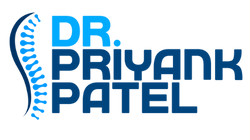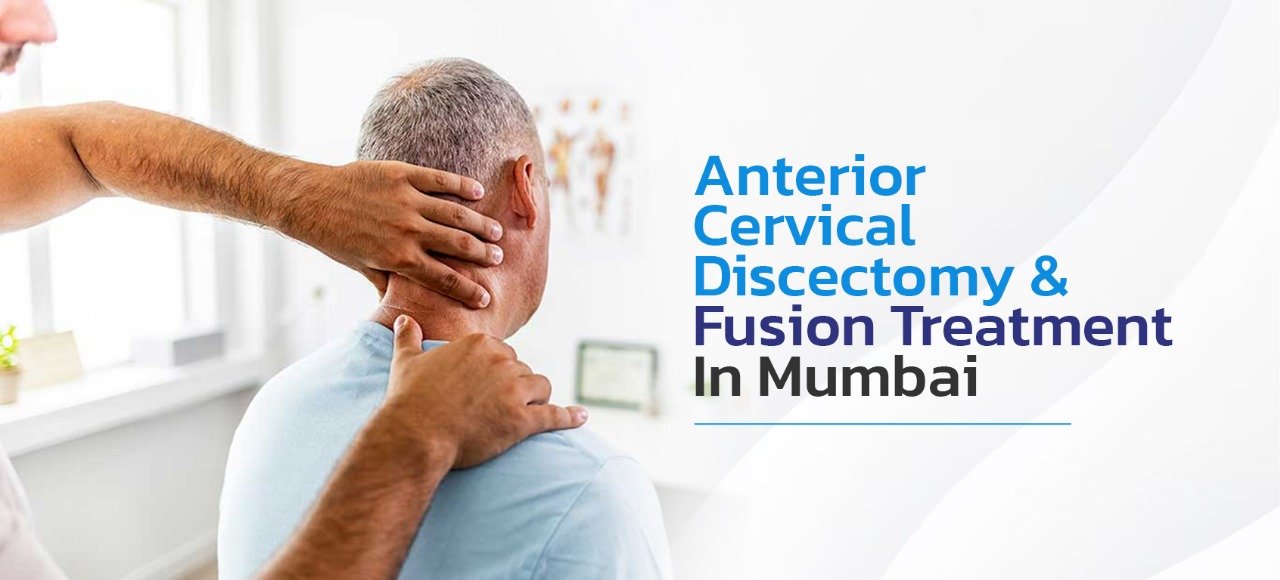
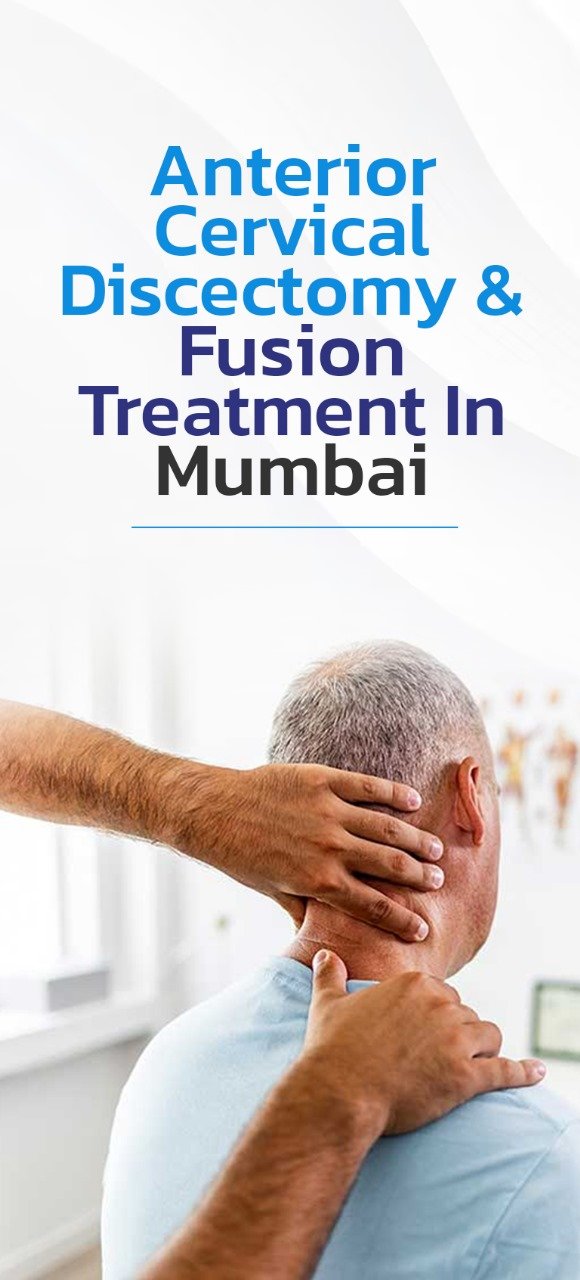
Unlocking Relief: Anterior Cervical Discectomy and Fusion Treatment in Mumbai for Lasting Spinal Health
Welcome to Dr. Priyank Patel’s premier anterior cervical discectomy and fusion (ACDF) treatment in Mumbai. Dr. Patel is a dedicated and skilled neurosurgeon committed to restoring your spinal health. ACDF is a specialized surgical procedure addressing cervical disc issues, providing relief from pain, and restoring mobility. With Dr. Patel’s expertise, trust in comprehensive care that prioritizes your well-being. Discover a path to a pain-free life through cutting-edge ACDF treatments tailored to your unique needs.

Looking for anterior cervical discectomy and fusion (ACDF) treatment in Mumbai? Consult Dr. Priyank Patel.
If you’re searching for top-notch anterior cervical discectomy and fusion (ACDF) treatment in Mumbai, your best choice is to consult with Dr. Priyank Patel, a highly skilled orthopedic surgeon. Specializing in both surgical and non-surgical management of spine disorders, Dr. Patel is renowned for his expertise in spine tumors. Credited as one of India’s youngest independent surgical consultants, he brings extensive international training in advanced spinal procedures, including minimally invasive surgery and artificial disc replacement. Dr. Patel’s approach combines surgical precision with a commitment to conservative methods, emphasizing an active lifestyle. Renowned for treating athletes from the Indian National Cricket Team and the film industry, he is a trusted name in the international spine care circuit.
Beyond his role as a surgeon, Dr. Patel actively contributes to philanthropy, playing a key role in establishing rural spine care centers across India. With a vision for a National Spine Tumor Foundation, he aims to address spine tumor cases, filling a critical gap in the country’s healthcare landscape. For personalized, expert care in ACDF treatment, Dr. Priyank Patel is your trusted partner, ensuring a comprehensive and compassionate approach to spine health. As the go-to anterior cervical discectomy and fusion surgeon in Mumbai and recognized as the best doctor for anterior cervical discectomy and fusion in Mumbai, Dr. Patel is your premier anterior cervical discectomy and fusion specialist in Mumbai.
What Is Anterior Cervical Discectomy And Fusion (acdf) ?
Anterior Cervical Discectomy and Fusion (ACDF) is a specialized surgical procedure designed to address complex cervical spine issues, with a focus on the neck region. When conservative treatments fall short, ACDF emerges as an effective solution for persistent pain, weakness, or numbness in the neck, arms, or hands. This procedure becomes particularly crucial for conditions such as herniated discs, degenerative disc disease, or cervical spinal stenosis. For individuals seeking anterior cervical discectomy and fusion treatment in Mumbai, this comprehensive surgical intervention is tailored to alleviate symptoms and restore spinal function.
The ACDF process involves meticulous steps, including a detailed overview of the surgical procedure
Acute Cauda Equina Syndrome
- Herniated discs: caused by the protrusion or rupture of the cervical disc’s soft center, exerting pressure on spinal nerves.
- Degenerative Disc Disease: A natural wear-and-tear process leading to pain and reduced mobility in the cervical spine.
- Cervical Spinal Stenosis: The narrowing of the spinal canal results in pressure on the spinal cord and nerves.
Procedure Overview
- Anterior Approach: Surgeons use the front of the neck for direct access to the cervical spine, facilitating precise removal of the affected disc.
- Discectomy: the meticulous removal of the damaged disc, relieving pressure on spinal nerves and the spinal cord.
Spinal Fusion
- Bone Graft or Synthetic Material: Insertion of a bone graft (autograft or allograft) into the vacated disc space.
- Promoting Fusion: The graft encourages new bone growth, connecting adjacent vertebrae and stabilizing the spine.
- Metal Plates and Screws: Optional hardware may be used to secure the graft, enhancing stability during the healing process.
Postoperative Care
- Recovery Time: Patients undergo a dedicated recovery period to allow proper spinal fusion, often involving the use of a cervical collar.
- Physical Therapy: Rehabilitation focuses on restoring strength, flexibility, and overall neck function.
- Follow-up Monitoring: Regular appointments with the surgeon assess healing progress and address any concerns.
Effectiveness and Considerations
- Pain Relief: ACDF aims to alleviate pain, restore spinal alignment, and improve neck function.
- Potential Risks: As with any surgery, there are risks, including infection, nerve damage, or complications related to the fusion process.
- Patient Selection: The decision to undergo ACDF is individualized, considering the patient’s specific condition, symptoms, and overall health.
For those specifically seeking anterior cervical discectomy and fusion surgery in Mumbai, this detailed and meticulous surgical intervention provides a targeted approach to address cervical spine issues and enhance overall spinal stability.
Types of Anterior Cervical Discectomy and Fusion (ACDF)
Anterior Cervical Discectomy and Fusion (ACDF) encompasses various surgical approaches, each tailored to specific cervical spine conditions. Here are the different types-
Traditional ACDF
- This standard procedure is a common choice for those seeking anterior cervical discectomy and fusion treatment in Mumbai.
- The surgeon accesses the cervical spine from the front of the neck, removes the damaged disc, and inserts a bone graft to promote fusion.
Cervical Disc Arthroplasty (Artificial Disc Replacement)
- A viable option for those searching for anterior cervical discectomy and fusion surgeons in Mumbai.
- This procedure involves replacing the damaged disc with an artificial one to preserve natural neck motion.
Minimally Invasive ACDF
- Ideal for patients in Mumbai seeking a less invasive option for their anterior cervical discectomy and fusion treatment.
- Small incisions and specialized instruments reduce muscle disruption, potentially expediting recovery.
Hybrid ACDF
- It combines traditional ACDF with cervical disc arthroplasty.
- Suitable for those in Mumbai looking for a comprehensive approach to address varying spinal conditions.
Zero Profile ACDF
- An appealing choice for individuals seeking anterior cervical discectomy and fusion surgery in Mumbai.
- Uses stand-alone cages or spacers without additional hardware, reducing the risk of postoperative complications.
Revision ACDF
- Beneficial for those in Mumbai with prior ACDF surgeries experiencing complications.
- Addresses issues such as incomplete fusion or hardware-related problems.
Dynamic Stabilization (ACDF)
- Offers an option for patients in Mumbai seeking stability with controlled movement.
- Preserves some flexibility while providing the necessary spinal support.
Computer-Assisted Navigation (ACDF)
- Incorporates advanced technology for precise surgical navigation.
- Particularly beneficial for those in Mumbai looking for state-of-the-art techniques in ACDF procedures.
Choosing the appropriate ACDF type is a collaborative decision between patients in Mumbai and their healthcare providers. It depends on individual conditions, the number of affected disc levels, and the expertise of the chosen surgeon. If you’re considering anterior cervical discectomy and fusion treatment in Mumbai, consult with a spine specialist to determine the most suitable approach for your specific needs.
How Common Is Anterior Cervical Discectomy and Fusion (ACDF)?
Anterior Cervical Discectomy and Fusion (ACDF) is a frequently performed surgical procedure, indicating its prevalence in addressing specific cervical spine conditions. Here are key sub-points to elaborate on its commonality-
Prevalence Across Conditions
- ACDF is commonly recommended for various cervical spine issues, including herniated discs, degenerative disc disease, and spinal stenosis.
- The versatility of ACDF in treating different conditions contributes to its widespread use.
Routine surgical intervention
- ACDF has become a routine surgical intervention for qualified candidates.
- The familiarity of medical professionals with this procedure reflects its established status in the realm of cervical spine surgeries.
Proven Effectiveness
- The commonality of ACDF is also attributed to its proven effectiveness in providing relief to patients.
- Positive outcomes and success stories contribute to the procedure’s widespread acceptance.
Patient Satisfaction
- Many patients who undergo ACDF express satisfaction with the results, further establishing its common usage.
- Positive feedback from individuals who have experienced improved spinal health adds to the procedure’s reputation.
Advancements in Surgical Techniques
- Continuous advancements in surgical techniques have streamlined the ACDF procedure.
- These advancements contribute to its common application, ensuring a more efficient and effective surgical experience.
Understanding the commonality of ACDF emphasizes its reliability and acceptance within the medical community as a well-established and frequently utilized surgical solution for cervical spine conditions. If you are considering anterior cervical discectomy and fusion treatment in Mumbai or have questions about its suitability for your specific situation, consulting with a qualified healthcare professional, such as a specialized surgeon in Mumbai, is advisable.
Who Is At Risk for Anterior Cervical Discectomy and Fusion (ACDF)?
Anterior Cervical Discectomy and Fusion (ACDF) is a surgical intervention primarily recommended for individuals facing specific cervical spine issues. Several factors may increase the likelihood of someone being at risk for ACDF. Here’s an overview of individuals who commonly fall into this category:
- Degenerative Disc Conditions: Those experiencing degenerative disc diseases, where the spinal discs lose their cushioning properties over time, are often at risk for ACDF.
- Herniated Discs: Individuals with herniated or bulging discs in the cervical spine may be candidates for ACDF, as the procedure aims to address these disc-related issues.
- Spinal Stenosis: People diagnosed with spinal stenosis, a condition where the spinal canal narrows, putting pressure on the spinal cord, may be at risk for ACDF.
- Failed non-surgical treatments: Patients who have not found relief through non-surgical treatments, such as physical therapy or medications, might be considered at risk for ACDF.
- Persistent pain and neurological symptoms: Those experiencing persistent pain, weakness, or neurological symptoms related to cervical spine conditions may be recommended for ACDF.
- Prior unsuccessful surgeries: Individuals who have undergone previous spine surgeries without successful outcomes may be at risk for ACDF as a corrective measure.
- Traumatic Injuries: Those who have experienced traumatic injuries to the cervical spine, resulting in disc damage or instability, may be candidates for ACDF.
It’s important to note that the decision to undergo ACDF is based on a thorough assessment by a qualified healthcare professional. A spine specialist, such as an orthopedic surgeon or neurosurgeon, will carefully evaluate individual cases to determine the most appropriate course of action. If you suspect you may be at risk for ACDF or have questions about your spinal health, consulting with a medical professional is crucial for personalized guidance. Additionally, if you are considering anterior cervical discectomy and fusion treatment in Mumbai, it’s advisable to inquire about the surgery cost in Mumbai for informed decision-making.
Do You Need Surgery for Anterior Cervical Discectomy and Fusion (ACDF)?
Deciding whether surgery is necessary for anterior cervical discectomy and fusion (ACDF) is a significant step, and it requires careful consideration. Here are key factors to help you determine if ACDF surgery is the right choice for you:
- Persistent Pain and Discomfort: If you are experiencing persistent neck pain, radiating arm pain, or discomfort that doesn’t respond well to non-surgical treatments, ACDF may be a viable solution.
- Diagnosis of disc issues: A diagnosis of conditions such as herniated discs, degenerative disc disease, or spinal stenosis might indicate the need for ACDF surgery to address these specific cervical spine problems.
- Neurological Symptoms: The presence of neurological symptoms like weakness, tingling, or numbness in the arms or hands may be an indication that surgery is necessary to alleviate pressure on the spinal cord or nerve roots.
- Failed Conservative Treatments: If non-surgical treatments such as physical therapy, medications, and lifestyle adjustments have not provided adequate relief, ACDF surgery could be a recommended next step.
- Progression of Symptoms: If your symptoms are progressively worsening, surgery may be considered to prevent further deterioration and to improve your overall quality of life.
- Impact on Daily Activities: Consider the extent to which your symptoms impact your daily activities and quality of life. If they significantly limit your ability to perform routine tasks, ACDF surgery may be a beneficial option.
- Discussion with a Specialist: Consultation with a spine specialist, such as the best doctor for anterior cervical discectomy and fusion treatment in Mumbai, is crucial. They can thoroughly evaluate your condition, discuss treatment options, and help you make an informed decision.
Remember that the decision to undergo ACDF surgery is highly individualized and should be based on a comprehensive assessment of your specific situation. If you are unsure whether surgery is necessary for your anterior cervical discectomy and fusion, seeking the advice of a qualified healthcare professional is essential for personalized guidance tailored to your needs.
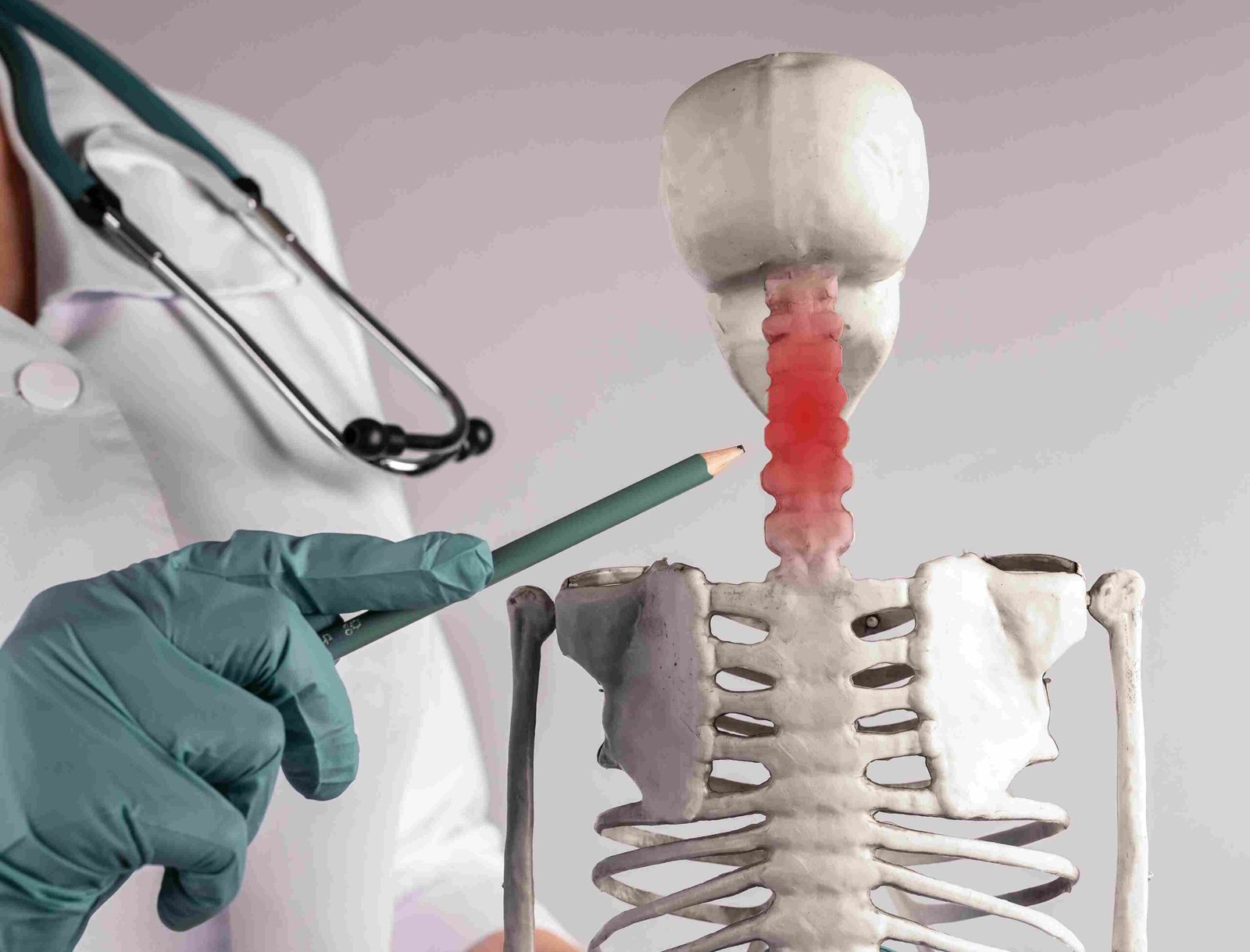
Symptoms of Anterior Cervical Discectomy and Fusion (ACDF)
Anterior Cervical Discectomy and Fusion (ACDF) is a surgical procedure designed to address specific cervical spine conditions. Recognizing the symptoms that may warrant ACDF is crucial for timely intervention. Here are common symptoms associated with the need for ACDF-
- Neck Pain: Persistent and localized neck pain, often radiating into the shoulders and upper back, may indicate cervical spine issues requiring evaluation for ACDF.
- Arm pain and weakness: Radiating pain, tingling, or weakness extending into one or both arms can signal nerve compression in the cervical spine, prompting consideration of ACDF.
- Numbness and Tingling: Numbness or tingling sensations in the arms, hands, or fingers may result from nerve compression or irritation, indicating a potential need for ACDF.
- Difficulty in Gripping or Holding Objects: Weakness or difficulty in gripping objects or performing fine motor tasks with the hands may be a symptom of cervical spine issues requiring ACDF.
- Limited Range of Motion: Reduced flexibility and a limited range of motion in the neck could be indicative of degenerative changes, disc herniation, or other conditions addressed by ACDF.
- Pain Aggravated by Movement: Pain that worsens with specific movements, such as tilting the head or neck rotation, may suggest the need for ACDF to address instability or disc-related issues.
- Difficulty Swallowing (Dysphagia): Rarely, cervical spine issues requiring ACDF can lead to difficulty swallowing, known as dysphagia, due to pressure on the esophagus.
- Balance and Coordination Issues: In some cases, cervical spine problems may contribute to balance and coordination issues, highlighting the need for evaluation and potential ACDF.
- Continued Discomfort Despite Conservative Treatments: If symptoms persist despite non-surgical treatments like physical therapy and medications, ACDF may be considered for more effective and lasting relief.
- Diagnostic Findings: Imaging studies, such as MRI or CT scans, revealing disc herniation, spinal stenosis, or other structural abnormalities, may prompt consideration of ACDF.
It’s important to note that the presence of these symptoms does not automatically mean ACDF is the only option. Consulting with a qualified healthcare professional, such as an anterior cervical discectomy and fusion treatment in Mumbai, is crucial for an accurate diagnosis and a personalized treatment plan tailored to address your specific symptoms and condition.
Causes of Anterior Cervical Discectomy and Fusion (ACDF)
Anterior Cervical Discectomy and Fusion (ACDF) is a surgical procedure commonly recommended for specific cervical spine conditions. Understanding the underlying causes that may necessitate ACDF is essential for informed decision-making. Here are common causes leading to the consideration of ACDF:
- Degenerative Disc Disease: Aging can lead to wear and tear on the cervical discs, causing degenerative changes. This can result in disc dehydration, reduced disc height, and the need for ACDF to address associated symptoms.
- Herniated Discs: Disc herniation occurs when the inner gel-like substance of a disc protrudes outward, often pressing on spinal nerves. ACDF may be recommended to alleviate pressure and treat symptoms caused by herniated discs.
- Spinal Stenosis: Narrowing of the spinal canal, known as spinal stenosis, can occur due to factors like aging or arthritis. ACDF is considered when stenosis leads to compression of the spinal cord or nerve roots.
- Traumatic Injuries: Accidents or trauma to the neck can cause damage to the cervical discs, leading to instability or compression. ACDF may be necessary to stabilize the spine and address the resulting symptoms.
- Disc Wear and Tear: Prolonged wear and tear on cervical discs, often associated with repetitive motions or poor posture, can contribute to conditions requiring ACDF, such as disc degeneration.
- Unsuccessful previous surgeries: Individuals who have undergone prior spine surgeries without successful outcomes may require ACDF as a corrective measure to address persistent issues.
- Tumors or infections: Rarely, tumors or infections affecting the cervical spine may necessitate ACDF for the removal of diseased tissue and stabilization of the spine.
- Congenital Abnormalities: Some individuals may have congenital abnormalities in the cervical spine, such as malformed discs or vertebrae, which can lead to symptoms requiring ACDF.
- Chronic neck pain: Chronic neck pain that is unresponsive to conservative treatments may be indicative of underlying structural issues, prompting consideration of ACDF for long-term relief.
- Structural Abnormalities: Various structural abnormalities, including abnormalities in disc shape or alignment, may contribute to symptoms that can be addressed through ACDF.
It’s crucial to note that the decision to undergo ACDF is based on a thorough evaluation by a qualified healthcare professional. A spine specialist, such as an orthopedic surgeon or neurosurgeon, will assess individual cases to determine the most appropriate course of action based on the underlying causes and specific conditions present in each patient. If you are in Mumbai, consulting with an anterior cervical discectomy and fusion treatment specialist in Mumbai is recommended for personalized care.
Diagnosis of Anterior Cervical Discectomy and Fusion (ACDF)
The diagnosis of anterior cervical discectomy and fusion (ACDF) involves a comprehensive evaluation by a healthcare professional, typically a spine specialist. The process includes several key steps to accurately assess the patient’s condition and determine the need for ACDF:
- Medical History: The healthcare provider will gather a detailed medical history, including information about the patient’s symptoms, previous treatments, and any underlying health conditions.
- Physical Examination: A thorough physical examination is conducted to assess neurological function and range of motion and identify any signs of cervical spine issues, such as tenderness or muscle weakness.
- Imaging Studies: Diagnostic imaging, such as X-rays, MRI (Magnetic Resonance Imaging), or CT (Computed Tomography) scans, may be ordered to visualize the cervical spine’s structural integrity. These images help identify disc herniation, spinal stenosis, or other abnormalities.
- Electromyography (EMG): EMGs may be performed to assess nerve function and detect abnormalities. It involves placing small electrodes on the skin to measure electrical activity in muscles and nerves.
- Discography: In some cases, a discography procedure may be recommended to evaluate disc abnormalities. This involves injecting contrast dye into the discs and imaging them to identify areas causing pain.
- Flexibility and Stability Tests: The healthcare provider may conduct tests to assess the flexibility and stability of the cervical spine. This helps in understanding the extent of any instability or abnormalities.
- Patient Evaluation: The patient’s overall health, lifestyle, and how symptoms impact daily activities are considered. This holistic approach helps tailor the treatment plan to the individual’s specific needs.
- Second Opinion: In complex cases or if the patient desires additional input, seeking a second opinion from another spine specialist is a valid and encouraged step.
- Conservative Treatment Assessment: The effectiveness of conservative treatments, such as physical therapy or medications, may be assessed. If symptoms persist despite these measures, ACDF may be considered.
- Patient Discussion: The healthcare provider discusses the diagnosis, treatment options, and potential benefits and risks of ACDF with the patient. This allows for shared decision-making between the patient and the medical team.
The diagnosis of ACDF is not solely based on one test but rather on a combination of clinical evaluations and diagnostic tools. This thorough approach ensures an accurate understanding of the patient’s condition and guides the development of an appropriate and personalized treatment plan. If you are in Mumbai, seeking the best treatment for anterior cervical discectomy and fusion treatment in Mumbai is recommended for comprehensive and effective care.
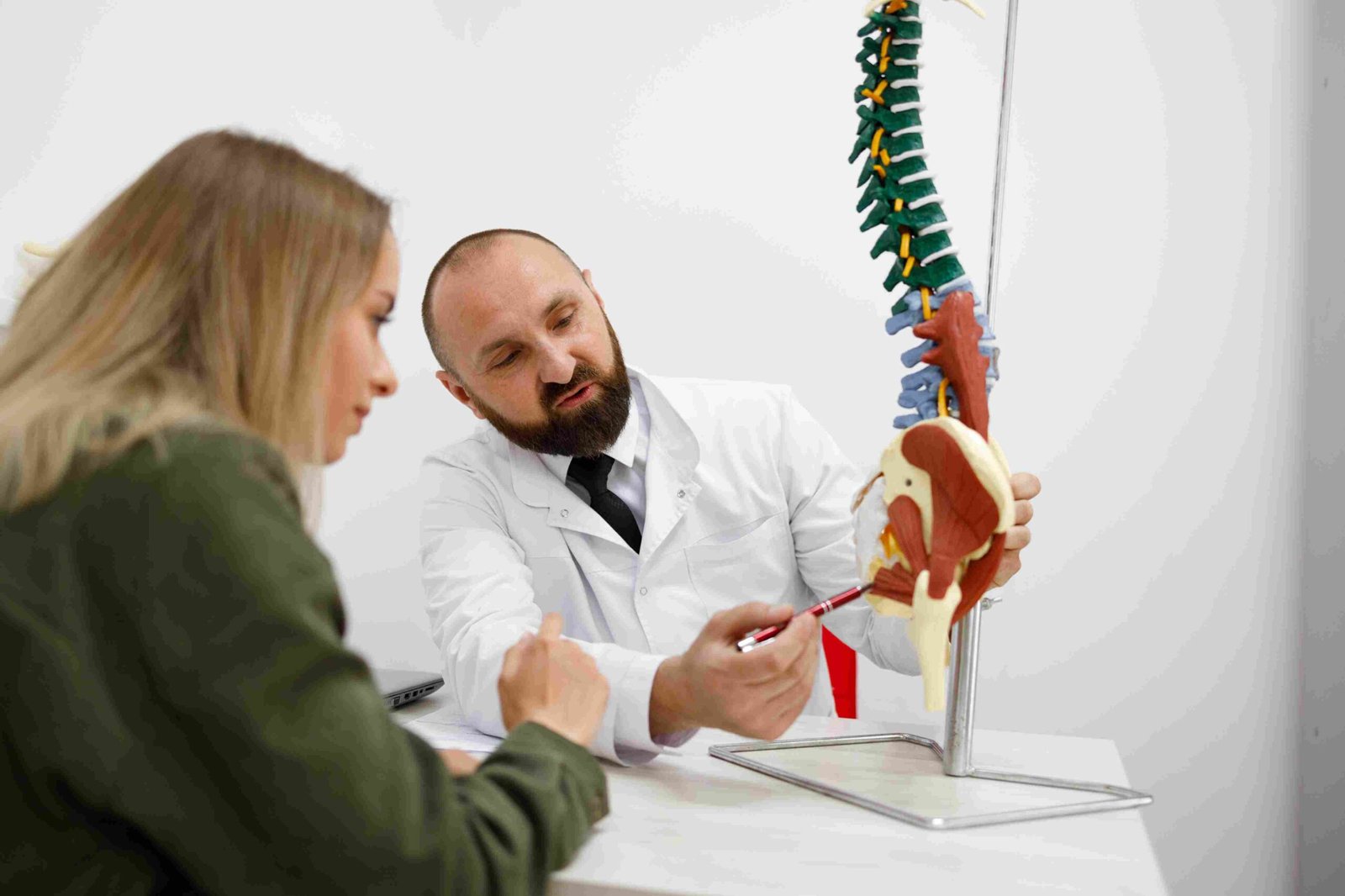
Anterior Cervical Discectomy and Fusion (ACDF) Treatment Options
Anterior Cervical Discectomy and Fusion (ACDF) is a surgical procedure designed to address specific conditions in the cervical spine. Treatment options for ACDF involve a comprehensive approach to alleviate symptoms, stabilize the spine, and promote long-term recovery. Here are key treatment options associated with ACDF-
Advancements in Surgical Techniques
- Physical Therapy: Targeted exercises and stretches may be prescribed to improve neck strength, flexibility, and overall function.
- Medications: Pain relievers and anti-inflammatory drugs may be recommended to manage discomfort and reduce inflammation.
- Lifestyle Modifications: Adopting ergonomic practices, maintaining a healthy weight, and avoiding activities that exacerbate symptoms can contribute to improved spinal health.
Non-Surgical Interventions
- Epidural Steroid Injections: In some cases, corticosteroids may be injected near the affected nerve roots to reduce inflammation and provide temporary relief.
- Nerve Root Blocks: Local anesthetics or steroids can be injected directly around specific nerve roots to alleviate pain.
Anterior Cervical Discectomy and Fusion (ACDF)
- Surgical Intervention: When conservative and non-surgical measures are insufficient, ACDF may be recommended.
- Discectomy: the removal of the damaged or herniated disc that is pressing on nerves.
- Fusion: stabilization of the spine by fusing adjacent vertebrae with the use of bone grafts or artificial implants.
Advanced Surgical Techniques
- Minimally Invasive ACDF: Utilizes smaller incisions and specialized instruments to minimize tissue disruption and promote faster recovery.
- Artificial Disc Replacement: In some cases, rather than fusion, an artificial disc may be implanted to maintain motion at the treated level.
Postoperative Care
- Rehabilitation: A structured rehabilitation program may be recommended to aid in recovery, improve strength, and prevent complications.
- Activity Modification: Patients are advised to follow specific guidelines regarding activities and movements during the initial healing period.
Patient Education
- Preoperative Counseling: Providing detailed information about the procedure, potential risks, and expected outcomes.
- Postoperative Guidance: Educating patients on postoperative care, follow-up appointments, and the importance of adhering to the recommended treatment plan.
Follow-Up Monitoring
- Imaging Studies: Periodic imaging, such as X-rays or MRIs, may be performed to assess the fusion’s success and overall spinal health.
- Regular Check-ups: Scheduled follow-up appointments allow healthcare providers to monitor progress, address concerns, and make any necessary adjustments to the treatment plan.
It’s crucial to note that the choice of treatment depends on individual factors, including the severity of symptoms, the underlying condition, and the patient’s overall health. Consulting with a qualified healthcare professional, such as a spine specialist, is essential to determining the most appropriate and personalized treatment approach for anterior cervical discectomy and fusion treatment in Mumbai and potential surgery in Mumbai.
In conclusion, Dr. Priyank Patel offers premier anterior cervical discectomy and fusion (ACDF) treatment in Mumbai. His expertise combines surgical precision with a commitment to conservative methods. ACDF, a frequently performed and effective procedure, addresses various cervical spine conditions. Dr. Patel’s comprehensive care, including advanced surgical techniques and patient education, ensures a path to a pain-free life. If considering ACDF treatment in Mumbai, consult Dr. Patel for personalized and compassionate spine health care.
Frequently Asked Questions
ACDF is a surgical procedure addressing cervical spine issues by removing a damaged disc and stabilizing the spine through fusion.
ACDF is recommended when conservative treatments fail and conditions like persistent neck or arm pain require surgical intervention.
The procedure involves an anterior approach, removing the damaged disc, and achieving fusion using bone grafts or artificial implants.
ACDF is effective for herniated discs, degenerative disc disease, cervical spinal stenosis, and nerve compression or instability.
Yes, variations include traditional ACDF, cervical disc arthroplasty, minimally invasive ACDF, hybrid ACDF, and others.
ACDF is a frequently performed surgical procedure due to its versatility and effectiveness in addressing various cervical spine conditions.
Candidates include individuals with degenerative disc conditions, herniated discs, spinal stenosis, and persistent pain or neurological symptoms.
Consider surgery if you experience persistent pain, neurological symptoms, or failed conservative treatments, and consultation with a specialist indicates the necessity for ACDF.
Risks include infection, nerve damage, complications related to fusion, and general surgical risks. A thorough preoperative assessment minimizes these risks.
Recovery involves a dedicated period for spinal fusion, physical therapy, and follow-up appointments to monitor healing progress. Activity modification and rehabilitation contribute to a successful recovery.

